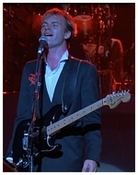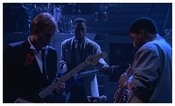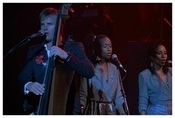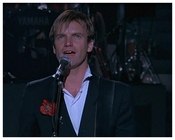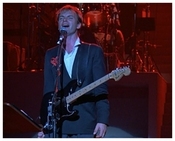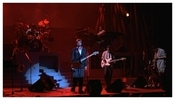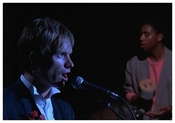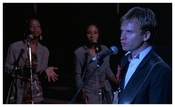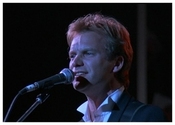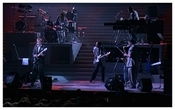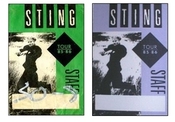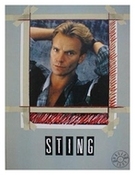
Sting's lyrical power...
From the steaming urgency of his opening song, 'Shadows in the Rain', to the ethereal grace of his final encore, 'Message in a Bottle', Sting proved to an SRO Merriweather Post Pavilion crowd on Saturday night that he's an arresting pop presence even outside the context of the Police.
For his first solo album and for this, his first solo tour, Sting surrounded himself with four bright, brash musicians whose reputations have been made in the jazz field, but who grew up in the era of funk and fusion.
Saxophonist Branford Marsalis and keyboard player Kenny Kirkland (from Wynton Marsalis' quintet), rock-steady drummer Omar Hakim (Weather Report) and bassist Darryl Jones (Miles Davis) sounded more attuned and comfortable in concert than on record, investing Sting's new songs, and a few Police staples, with a tough, exuberant underpinning that may have surprised fans used to the Police's subtler elasticity or the new album's sober structures.
But rather than resulting in a static jazz-rock fusion, Sting's intriguing new alliance provides a provocative cushion for his keening vocals and supple melodies.
Although the lyrics were sometimes obscured by an unbalanced sound system, Sting's songs were delivered powerfully. Often built upon sinuous melodies, they are ambitious both lyrically and thematically.
For instance, the anthemic 'Children's Crusade' is a lament for lost generations and an exploration of the cynical exploitation of the young throughout history. It is cyclical and haunting, and not your standard pop fare.
In 'We Work the Black Seam', Sting celebrates the courage of England's striking coal miners while he attacks Margaret Thatcher's politics and the nuclear power lobby. Other songs dealt with emotional and political corruption - heady themes, but wrapped in haunting melodies, they entranced even as they enlightened. 'Black Seam', which could also stand as a metaphor for Sting's long-time passion for various Afro-American and Caribbean styles, was supple and elegant, though a Kirkland-powered pulse invested it with a nervous, unsettling edge.
Also highlighted were such contrasting numbers as 'Every Breath You Take' and 'If You Love Somebody, Set Them Free'. 'Every Breath', which needs to be as starkly arranged as it was originally perceived, did not benefit from a fleshed-out arrangement, but 'Roxanne', another Police hit, gained immensely from being stripped down (to Sting's solo guitar) and then embellished by Marsalis' searing soprano saxophone fills.
Songs such as the Police's 'Driven to Tears', 'Bring on the Night', 'Demolition Man', the instrumental 'The Dream of the Blue Turtles' and a hyperkinetic 'Fortress Around Your Heart' provided plenty of space for powerful statements from Marsalis and Kirkland, and less often from Hakim and Jones, who powered the proceedings the way Michael Spinks powered Larry Holmes into retirement.
Kirkland sounded particularly inspired during a long workout in 'Bring on the Night', at times echoing Joe Zawinul, Oscar Peterson and Jimmy Smith. But with Sting maintaining a low profile on guitar, it was Marsalis who was the standout soloist.
On the up-tempo songs, he'd blow up a storm in the manner of Wayne Shorter and Roland Kirk, or on 'Driven to Tears', of King Curtis. Yet he could be reflective, almost introspective on a neo-cabaret tune like 'Moon Over Bourbon Street'.
(c) The Washington Post by Richard Harrington
From the steaming urgency of his opening song, 'Shadows in the Rain', to the ethereal grace of his final encore, 'Message in a Bottle', Sting proved to an SRO Merriweather Post Pavilion crowd on Saturday night that he's an arresting pop presence even outside the context of the Police.
For his first solo album and for this, his first solo tour, Sting surrounded himself with four bright, brash musicians whose reputations have been made in the jazz field, but who grew up in the era of funk and fusion.
Saxophonist Branford Marsalis and keyboard player Kenny Kirkland (from Wynton Marsalis' quintet), rock-steady drummer Omar Hakim (Weather Report) and bassist Darryl Jones (Miles Davis) sounded more attuned and comfortable in concert than on record, investing Sting's new songs, and a few Police staples, with a tough, exuberant underpinning that may have surprised fans used to the Police's subtler elasticity or the new album's sober structures.
But rather than resulting in a static jazz-rock fusion, Sting's intriguing new alliance provides a provocative cushion for his keening vocals and supple melodies.
Although the lyrics were sometimes obscured by an unbalanced sound system, Sting's songs were delivered powerfully. Often built upon sinuous melodies, they are ambitious both lyrically and thematically.
For instance, the anthemic 'Children's Crusade' is a lament for lost generations and an exploration of the cynical exploitation of the young throughout history. It is cyclical and haunting, and not your standard pop fare.
In 'We Work the Black Seam', Sting celebrates the courage of England's striking coal miners while he attacks Margaret Thatcher's politics and the nuclear power lobby. Other songs dealt with emotional and political corruption - heady themes, but wrapped in haunting melodies, they entranced even as they enlightened. 'Black Seam', which could also stand as a metaphor for Sting's long-time passion for various Afro-American and Caribbean styles, was supple and elegant, though a Kirkland-powered pulse invested it with a nervous, unsettling edge.
Also highlighted were such contrasting numbers as 'Every Breath You Take' and 'If You Love Somebody, Set Them Free'. 'Every Breath', which needs to be as starkly arranged as it was originally perceived, did not benefit from a fleshed-out arrangement, but 'Roxanne', another Police hit, gained immensely from being stripped down (to Sting's solo guitar) and then embellished by Marsalis' searing soprano saxophone fills.
Songs such as the Police's 'Driven to Tears', 'Bring on the Night', 'Demolition Man', the instrumental 'The Dream of the Blue Turtles' and a hyperkinetic 'Fortress Around Your Heart' provided plenty of space for powerful statements from Marsalis and Kirkland, and less often from Hakim and Jones, who powered the proceedings the way Michael Spinks powered Larry Holmes into retirement.
Kirkland sounded particularly inspired during a long workout in 'Bring on the Night', at times echoing Joe Zawinul, Oscar Peterson and Jimmy Smith. But with Sting maintaining a low profile on guitar, it was Marsalis who was the standout soloist.
On the up-tempo songs, he'd blow up a storm in the manner of Wayne Shorter and Roland Kirk, or on 'Driven to Tears', of King Curtis. Yet he could be reflective, almost introspective on a neo-cabaret tune like 'Moon Over Bourbon Street'.
(c) The Washington Post by Richard Harrington

